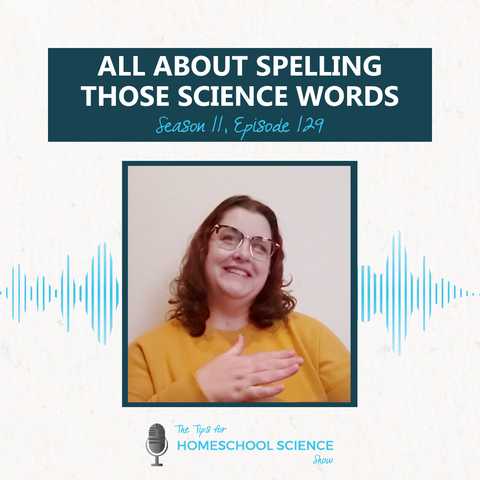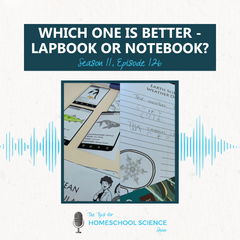FREE Shipping on all our products! (Please Note: Orders may experience a delay of a week or more in shipping due to the high volume of orders at this time of year.)
FREE Shipping on all our products! (Please Note: Orders may experience a delay of a week or more in shipping due to the high volume of orders at this time of year.)
All About Spelling Those Science Words {Season 11, Episode 129}
March 25, 2024 7 min read

Season 11 of the Tips for Homeschool Science podcast is all about writing and science.
In this episode, we'll be interviewing Robin Williams from All About Spelling. In our conversation, we discussed tips and tricks for spelling all those science words!
Download the FREE All About Spelling Packet here.
Key Takeaways
-
Spelling words correctly is important for science.
- Games are a fantastic way to learn how to spell science words!
Listen to this episode
You can also listen to this podcast on iTunes, Podcast Addict, Castbox, Stitcher, or Spotify.
Share the Tips
If you found these homeschool science tips to be helpful, would you please take a moment to rate it in the podcasting app you use to listen to the show? This would help me tremendously in getting the word out so that more earbuds are filled with science-teaching encouragement.
Episode 129 - All About Spelling Those Science Words Full Transcript
00:00
For Season 11, we've been talking all about writing in science, and in this episode, we're going to talk about an overlooked aspect of writing, spelling, scientific words. Hi, I'm Paige Hudson, and you're listening to the Tips for Homeschool Science Show, where we're breaking down the lofty ideals of teaching science into building blocks you can use in your homeschool.
00:30
Hi. Today I'm excited to have Robin Williams from All About Spelling with us on the tips for Homeschool Science Show. She homeschooled her five kids and has also taught biology and chemistry, so she's really familiar with how to spell those Latin and Greek words and how difficult they can be. So I asked her to come on today and share some tips about spelling and science with us.
00:53
Thanks for coming on, Robin, and welcome to the Tips for Homeschool Science Show. Thank you for having me. Yeah. So the first question I want to ask you is, do we really need to worry about everything in science being spelled correctly when our kids are writing it down? That's actually a really good question. And the answers for the most part.
01:15
Yes. And there's a couple of reasons. The first is it's easy to misspell a word and it changes the meeting so we can go from hydro to hypo. And suddenly we're not talking about water any more. We're talking about being lower. Those slight misspellings and science can change meaning, but also when you're trying to convey that you know something to someone else, misspelling suggests that you don't know as much as you're trying to say, you know?
01:51
Yeah, that's a good point. So we definitely don't want our students to be misunderstood. And so we want to give them the skills to teach them how to spell correctly in science. So how do we handle spelling in science or spelling those science words? I have found the best way to teach science words is teaching the morphology. Morphology means word parts.
02:15
And so when you learn hydro, any time you see that word part, you know, we're talking about water immediately. So this helps with both vocabulary, but it also tells us every time we hear hydro or some form of that, or if we're talking about a word that deals with water, we know exactly how it's spelled. It's always a wide.
02:40
Oh. Mm hmm. That's a really good tip. So what is the best tip you have for spelling in science other than looking at the morphologies there? You know, do you want students do copy work? Is there other tips that you have for us for teaching them spelling within science? I think the best tip is to play with those morphology.
03:04
And I have a couple of handouts for your listeners. One is for Latin roots and one is for Greek roots. The Greek word handout has little cut out, so you can move the little words around so we can have a thermometer and we can have spectral meter or spectrometer and so on, and you can see how the parts work.
- Download the FREE All About Spelling Packet
03:27
And then so we're learning little parts, even though we're talking about a five syllable word. It becomes very easy to spell with those little parts. Yeah. And that's a fantastic way to introduce it and after that practice and use. Yeah. Yeah. Games are definitely the way to go and then using them. That's a really good advice. So what, what piece of advice?
03:55
This whole season we're talking about writing and science. So what piece of advice would you give to homeschool parents about when it comes to writing and science with science writing precision is very important. And when I have taught high schoolers, I find that a lot of them struggle with being able to describe what they have done and what they have observed with enough detail was that someone else who wasn't there understand and that I found takes both modeling so that I write or verbally tell them, you know, this is how we would describe what we saw under the microscope today or when one of my students describes that.
04:41
Well, she'll share that with everybody. And they're often surprised that in science it's still good to be a little bit literary. Some of the best descriptors are under the microscope. I saw this item that looked like a head of cabbage, which seems odd in a scientific writing, but anyone who's reading it knows exactly what you saw at that point.
05:10
Right. Yeah. And again, even from a young age, you want to start with lab reports. And from a young age, you either do dictation for them. They tell you what to write. But I found that just drawing what they saw is very important, because even at a higher level, even at university level, they're still going to be doing sketches of their experimentation.
05:37
So yeah, very true. Early and often, that's what we say here. Start of early and often start very simple at their level and then move on the way through. So by the time they get to your high school classes, they know how to describe what they've done in an experiment. So tell us more about all about spelling and how you guys can help us with spelling
05:59
those Latin and Greek words. Well, first I have those two handouts, but specifically our last level of all about spelling, all about following level seven, which can be used separately from the other levels. If your child is already solid on like a junior high spelling level, it has multiple lessons on those Latin and Greek roots so that they really get to focus on them.
06:30
As you'll see in the Latin root word tree handout is taking the bits and pieces and putting them together to fill a tree with different words. The root of it all about spelling overall starts at a very basic level to get younger students used to the idea of spelling words, spelling word parts. We add suffixes and prefixes separately so that even before we get to the Latin and Greek in scientific words, they're very familiar with the idea of we start with just this word part, and then we add to the beginning, then we add to the end, and we build this much longer word from that.
07:17
And then, as I mentioned, in level seven, there's multiple lessons on the Latin and Greek that that can be used with a higher level student who already knows how to spell well. Or you can use the levels all along and get there ready to learn all how those pieces work together to build words. Yeah, we've done so. Our oldest went through all of our spelling before Level seven came out, but our youngest one did get the benefit of Level seven.
07:48
So I can say it was a great foundation for us and even for me. I learned some spelling tips from all about spelling it with my daughter. We got to level six and then we had a delay. But when level seven came out, it was like two years later she was already in high school. It was still so beneficial that I still had her do this.
08:08
And that was before I worked for All About Learning Press. So I've been using All About Spelling, all about reading for long, since before I started working from them. Yeah. So where's the best place that people can find all about spelling or you online will for All About Spelling in general it's All About Learning Press Dot com you'll find all kinds of information there we'll log that you can access from there all about learning press has a Facebook page and I'm active on that.
08:42
We have a Facebook support group. I'm active there. You can reach me by email at support and all about learning press dot com. And one of the handouts we have has all kinds of contact information plus links to free resources and more information about all about spelling you'll find so you can get it directly through that handout. Okay.
09:07
And I'll make sure that I put a link to those PDF handouts in the show notes descriptions. And I believe you also said we do a coupon code. Oh yes. We are offering your listeners a coupon code for 10% off any of our materials. It will last for one week from the air date and the coupon code will be SAVE10
09:28
all squished together, no spaces. Okay, I really appreciate that and I hope you guys take advantage of that coupon code because we really learned a lot from all about spelling for our kids and it helped them not only with spelling science words, but spelling regular words as well. So thank you, Robin, for coming on. And talking about spelling and science.
09:51
We had some great tips with learning about the morphology of words and learning how to spell them and be precise with our writing and science. So I really appreciate you coming on and sharing with our listeners today. Thank you so much for having us. Did you know that all the programs in Elemental Science use notebooking and many of these have both a lab book and a notebooking page option.
Download the FREE All About Spelling Packet mentioned in the podcast here.
Also in {Podcast} The Tips for Homeschool Science Show
How should you handle notebooking through the different ages? {Season 11, Episode 128}
March 18, 2024 3 min read

Writing in Science with a Well-Trained Mind (Interview) {Season 11, Episode 127}
March 11, 2024 16 min read

Click "Read More" to listen in as Susan Wise Bauer and Susanna Jarret join Paige to share tips and tools about the third key to teaching science!
Which one is better in your homeschool - a lapbook or a notebook? {Season 11, Episode 126}
March 04, 2024 4 min read

Should you use a lapbook or a notebook in your homeschool? Click to get answers in this episode from The Tips for Homeschool Science Show.
Subscribe
Sign up to get the latest on sales, new releases and more …

